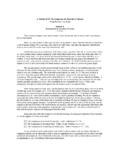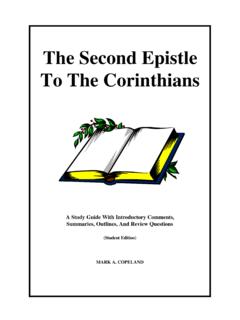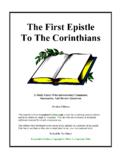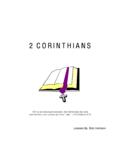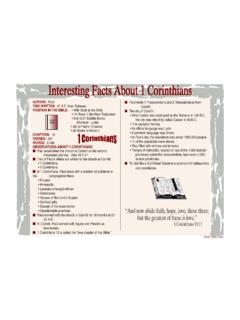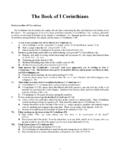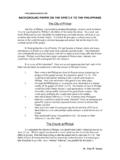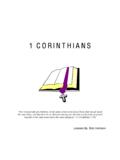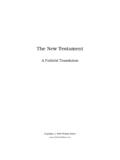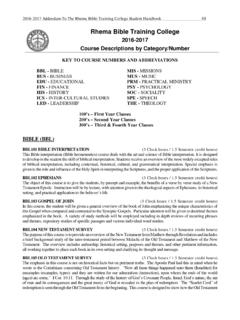Transcription of A Series of 11 Sermons on the Epistle of James …
1 A Series of 11 sermons on the epistle of James Preached by Lee Irons sermon 1: Introduction to the Book of James 5-12-02 This morning we begin a new sermon Series . I have chosen the book of James , and I have done so for several reasons. First, ever since Martin Luther rejected James as an Epistle of straw, this book has given Protestants a sort of uneasy feeling. We re not quite sure what to do with James , especially the apparent contradiction between James and Paul on the issue of justification by faith. I doubt that many of us would agree with Luther s harsh rejection. After all, it is in the canon, and so we can t question James without opening up doubt about other books in the canon. But at the same time, we do wonder about James . I ve decided to preach through this book because I want to show that there is no conflict.
2 It is true that Paul and James have their own unique insights into the gospel, but ultimately I m convinced, and I want you to be convinced, that they are in harmony. We ll deal with this when we come to chapter 2, but I ve also reserved the two finals Sermons , Sermons 10 and 11 to cover it in greater depth. The second reason I want to preach through James is that it offers a very helpful perspective on the Christian life that I think will be beneficial to you. I am referring to James perspective on trials and their value to us in our Christian walk. The word trials occurs right at the outset in 1:2. The word in Greek is peirasmos. Now this word is difficult to translate. Sometimes it means trials and sometimes it means temptations. The second usage occurs a few verses later in vv.
3 13-14, Let no one say when he is tempted, I am being tempted by God .. but each one is tempted when he is carried away and enticed by his own lust. Another possible translation is testing. This is probably the best translation for verse 2. Trials, tests, temptations. Perhaps no single word captures the full meaning and so we need all three. When James speaks of trials, tests, and temptations, then, he isn t just talking about trials in the sense of suffering. Look, for example, at vv. 9-10. Here James includes both the brother of humble circumstances and the rich man among those who are being tested and perhaps even tempted. The brother of humble circumstances is, by virtue of his humble circumstances, put in a position of testing. He may be tempted to grasp after the riches of the rich man, or he may be tempted to blame God for his poor condition.
4 Likewise, the rich brother is, by virtue of his riches, put in a position of testing. He may be tempted to boast, to become self-assured, and to oppress the poor. You see both are being tested, and in the midst of the test, they may be tempted to deviate from God s will. Both brothers are therefore called to take the opportunity afforded by this trial or testing, and to resist the temptation, to persevere in doing God s will, and thus to come through the trial with the positive outcome of being approved before God. James takes the entire first chapter to develop his theology of testing and temptation. Once has done so, he then applies it in three main areas: (1) The Temptation to Nominal Christianity: Faith s Obedience (2:1-26) (2) The Temptation to Doctrinal Strife: Faith s Gentle Wisdom (3:1 4:12) (3) The Temptation to Eschatological Indifference: Faith s Patience (4:13 5:20) So my second reason for picking this book is that I want to explore with you James theology of temptation and the way in which these trials or tests or temptations are an opportunity for us to have our faith confirmed and completed.
5 The Christian life is not easy. It is full of tests, and we must embrace each test as an opportunity to have our faith in Christ tested and matured. Sermons on the Epistle of James Page 2 2007 Lee Irons This morning in my first sermon I want to introduce you to the Book of James by raising an important question. And that is the question of whether or not James is even a Christian document to begin with. At first it might seem to be a basically Jewish writing. There are no references to the core narrative of the death and resurrection of Christ. In addition, the book has such a strong ethical flavor, with such an emphasis on works and obedience, that the gospel almost seems to have been left out. Luther seemed troubled by this seemingly law-centered rather than Christ-centered writing.
6 For these reasons, some scholars have argued that James was originally a Jewish document, and the two references to the Lord Jesus Christ in 1:1 and 2:1 were interpolations added by Christian scribes. But there are three compelling reasons to view James as a Christian writing through and through: (1) The author is Christian (2) The audience is Christian (3) The content is Christian (1) The author is Christian The first thing we are told is that James is the author of this letter. Although there are a handful of other Jameses in the New Testament, the consensus of church tradition is that this James is the brother of the Lord Jesus and the leader of the Jerusalem church. Let me give you some background on James . Matthew 13:55 tells us the names of Jesus brothers, and James is listed first.
7 Apparently, James and his other brothers did not come to faith in Jesus during his earthly ministry. Mark records one incident where Jesus family came to take custody of Jesus, saying that he had lost his senses. When Jesus is told that his mother and his brothers were standing outside, he said, Who are my mother and my brothers? Then looking about at those who were sitting around him, he said, Behold, my mother and my brothers! For whoever does the will of God, he is my brother and my sister and mother. However, the unbelief of James did not continue. For Paul tells us in 1 Corinthians 15, verse 7, that the risen Christ appeared to James . The implication is that this appearance was also a call to leadership alongside the twelve apostles and Paul himself.
8 In the book of Acts, he is first mentioned as being in a position of church authority in chapter 12. There we are told, after Peter s miraculous deliverance from imprisonment, that he left the Jerusalem church in the hands of James . From that point on in the book of Acts, he is the recognized leader of the Jewish Christians. Tradition has it that he was the first bishop of Jerusalem. In Galatians, where Paul is most zealous to defend the gospel against the Judaizers who were zealous for the Torah, it is interesting that Paul recognized the authority of James . Read Gal. 1:18-19; 2:9. This harmonizes with Luke s account of the council of Jerusalem, where James makes the decisive speech in favor of including the Gentiles in the church without making them get circumcised.
9 Read Acts 15:13-21 Later, in Acts 21, when Paul visited Jerusalem for the last time to deliver the collection for poor Jewish believers, James received Paul and his entourage gladly. Paul then reported to James and the elders the marvelous work of God in bringing the gospel to the Gentiles. Luke reports that when James and the elders heard this, they glorified God (vv. 17-20). Sermons on the Epistle of James Page 3 2007 Lee Irons At this point, the biblical record concerning James falls silent. However, we know from Josephus that James was stoned to death in AD 62 by the sanhedrin. Apparently he was envious that all the people were converting to Christianity, so the high priest at the time concocted a charge that James had violated the Torah, although Josephus doesn t tell us what the charge was.
10 Eusebius records these as his last words: Why are you asking me about the Son of Man? He is seated in heaven at the right hand of great power, and will come again on the clouds of heaven. And so they stoned him to death for his steadfast faith in Jesus Christ. So it is clear that James was a Christian man, deeply committed to Jesus as Messiah and Lord. It is true that James was a Jewish Christian. Indeed, he was the chief spokesman and representative of Jewish Christianity before the destruction of Jerusalem. Yet we must be careful not to overdo the Jewishness of James . He was a Christian first, and a man of Jewish heritage second. Look at the salutation again: James , the bondservant of God and of the Lord Jesus Christ. When the Judaizers wanted to impose circumcision and observance of the Torah on the Gentiles, James was the most powerful voice who argued for the inclusion of the these uncircumcised, non-Torah observant Gentiles within the people of God.
